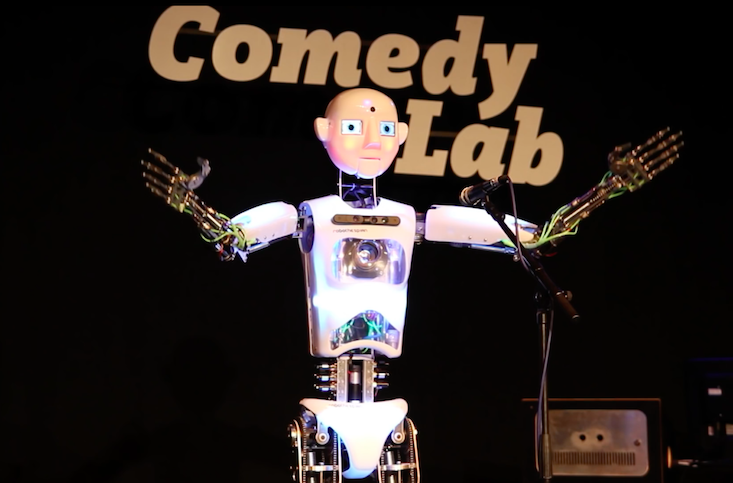
In the 2004 film “I, Robot,” Detective Del Spooner asks the sensible robot Sunny: “Can a robot write a symphony? Can a robot turn a canvas into a beautiful work of art? ”Sunny replies:“ Can you? ”
Scientists have been working on finding the answer to Spooner's question for the last ten years, and the results are quite surprising. Researchers from Rutgerovskogo University, from Facebook and Charleston College have developed a system for creating works of art called CAN [Creative Adversarial Network, or creative
generative-adversarial network ]. They trained CAN on 81,000 paintings of the pen of 1,119 artists created from the 15th to the 20th centuries. Experts on AI wrote algorithms for CAN to emulate such drawing styles as Renaissance, Impressionism and Pop Art, and then moved away from these styles and sought surprise from people who looked at pictures.
In a
paper from 2017, published on the arXiv website, scientists report that “people could not distinguish works created by the proposed system from drawings made by modern artists and on display at exhibitions.”
Aiva , a musical AI, has recently become the first machine registered as a composer by the French professional association of songwriters, composers and publishers SACEM. She studies on the basis of existing musical compositions, and then writes her own, new, emotional music.
If AI can be creative, can it make people laugh? Erik Horwitz and Daphne Schahaf, researchers at Microsoft, in conjunction with former New Yorker cartoonist Robert Mankoff, recently demonstrated that the AI can tell what is funny. They developed an AI to help sift through a huge pile of
titles coming to the New Yorker. “We developed a classifier that can choose the more ridiculous of two titles in 64% of cases, and used it to search for the best titles, which significantly reduced the load on the jury,” they wrote in the
paper .
And although AIs can take jokes, they still have a lot to learn before they can tell them. Usually their
jokes are based on puns and logical expectations.
The perspectives of the stand-up comic from the
Zoei robot (Zestful Outlook on Emotional Intelligence - a savory look at
emotional intelligence ), created in 2014 by researchers from the University of Marquette, look promising. Zoei creates jokes and gestures, recognizes faces and determines the audience’s response to previous jokes. He improves his work through machine learning technology, known as
reinforcement learning : much like a human comedian, by trial and error, Zoei maximizes the “reward” (laughter as a positive reaction) for his jokes, exploring options and going deep in the best of them.
With each new audience, Zoei has to start from scratch and build its repertoire on the fly. To some extent, people comedians do it, but they can memorize previous audiences and build associations between them, as well as write the text in advance and prepare for the performance. Watching the show “Zoei Live tonight” would start each time with a few awkward minutes at the microphone, or it would look like an unsuccessful pilot version of the season.
So far, Zoei has not been tested in experiments larger than one-on-one, or in different demographic sections - it has not come close to Aiva yet. But why have we not yet seen a comedian robot comparable in complexity to a robot composer?
This discrepancy can be explained by the fundamental differences between the main components of music and language. John Katz and David Pesetsky from the University of West Virginia and MIT, respectively, believe that these basic components are made up of “arbitrary pairs of sounds and meanings in the case of language; tonalities and their combinations in the case of music. " The arbitrariness of a language is considered to be
one of its defining properties : one spoken word itself does not carry meaning, since it can change in the context of a language, dialect, sentence, etc. Katz explains that "complex musical works can be composed of several basic elements, which can be counted from seven to several dozen." At the same time, “for a language, the number of basic elements is estimated at tens of thousands”.
With all its complexities and changes in the form of words, meanings and motives, language is the currency of comedy. Robert Provine, a neuroscientist and author of Laughter: A Scientific Investigation, showed that the little jokes that are filled with our days are often an embryo for the jokes of comedians. Provine once oversaw a group of people on a college campus and provoking them to laugh. Frazochki, which made people laugh, were similar to the scenario of an endless television
sitcom , "written by an extremely little talented author." Comedy is based on banal dialogues, coupled with cultural and social references.
We should be flattered that human language remains only our area. Its nuances are too complex for AI, so we can be infinitely more creative with language than machines. The robot comedian will have to go a very long way before he can cause an explosion of laughter, not to mention creating a whole number. In a
club of improvisations, it would be that awkward friend trying to give out a pun and
batinas to the microphone. So far, robots can only write jokes suitable for placement on consumer goods. But in the near future they will not reach
Dave Chapelle .